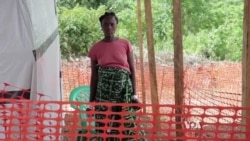Sierra Leone has one of the world’s highest infant mortality rates, and the Ebola outbreak is likely to push it even higher. Health officials say almost all pregnant women infected with Ebola, along with their unborn babies, die from the disease.
It’s a grim baseline. Last year, 107 out of every 1,000 infants born alive in the West African nation had died before their first birthday – compared with 65 in Guinea and 54 in Liberia, the two other countries most devastated by Ebola, or 6 in the United States. Those figures were compiled by the World Bank before the current outbreak began in March. Fetal mortality rates were not readily available.
Kailahun district in eastern Sierra Leone has the country's first and largest Ebola treatment center.
There, Doctors Without Borders has brought in midwife Ruth Kauffman to tend to three pregnant women who have the deadly virus.
Kauffman says there have been no reported cases of pregnant mothers and unborn babies surviving Ebola in Sierra Leone. Authorities do not know how many have died already.
"Especially in outbreaks, there are some groups of people who are more vulnerable than others," Kauffman says. "And what we see with Ebola is that if women [who] are pregnant contract Ebola, they have almost a 100 percent mortality rate."
The aid group's treatment center has set up a specialized ward for these pregnant mothers, says Axelle Vandoornick, the center’s field coordinator.
She said the midwife has "been on standby since yesterday, because, of course, a delivery is a very high-risk situation to carry out."
Kumbu Sakila survived Ebola, but her 24-week-old fetus did not. She has been at the treatment center three weeks, waiting to deliver the dead child she is still carrying.
Midwife Kauffman says Ebola presents an extra challenge during pregnancy and delivery.
At the Ebola treatment unit, medical personnel must fully cover themselves in protective gear that, especially in warm weather, become so hot and restrictive they can only work in it for an hour before risking dehydration.
"The way we can give medical care is very difficult because we cannot spend a lot of time with people," Kauffman said. "You can't spend a lot of time talking. You can't spend a lot of time, really, with one-on-one care, so it makes it challenging in that way, too."
The Ebola outbreak is straining an already-overburdened health care system in a country still recovering from a devastating civil war.
"They've lost a lot of really good health professionals" to Ebola, Kauffman said. The disease is "decimating the health infrastructure. It's going to impact everything from food production to family security to trust of the government to [the] economy. … It's hard to see Sierra Leone having to fight another battle."
The long-term impact of the Ebola outbreak on West Africa's maternal and infant mortality rates is still unknown. What seems certain is that the country's health care system remains crippled for now.





